-
 Bitcoin
Bitcoin $82,570.0410
0.02% -
 Ethereum
Ethereum $1,826.5479
0.54% -
 Tether USDt
Tether USDt $0.9999
0.02% -
 XRP
XRP $2.0904
-2.86% -
 BNB
BNB $606.1486
0.75% -
 Solana
Solana $126.0256
0.16% -
 USDC
USDC $1.0001
0.02% -
 Dogecoin
Dogecoin $0.1663
-1.67% -
 Cardano
Cardano $0.6610
-1.19% -
 TRON
TRON $0.2395
3.08% -
 Toncoin
Toncoin $4.1165
4.49% -
 Chainlink
Chainlink $13.5870
0.07% -
 UNUS SED LEO
UNUS SED LEO $9.1644
0.02% -
 Stellar
Stellar $0.2651
-1.16% -
 Avalanche
Avalanche $18.8132
-1.58% -
 Shiba Inu
Shiba Inu $0.0...01242
-1.05% -
 Sui
Sui $2.2652
-3.73% -
 Hedera
Hedera $0.1635
-3.80% -
 Litecoin
Litecoin $83.8611
-2.74% -
 Polkadot
Polkadot $4.0479
-0.57% -
 MANTRA
MANTRA $6.2006
-0.56% -
 Bitcoin Cash
Bitcoin Cash $304.0925
1.19% -
 Bitget Token
Bitget Token $4.4954
-1.67% -
 Dai
Dai $0.9998
-0.01% -
 Ethena USDe
Ethena USDe $0.9998
-0.01% -
 Pi
Pi $0.7464
-2.96% -
 Hyperliquid
Hyperliquid $13.0633
4.38% -
 Monero
Monero $214.1951
-1.81% -
 Uniswap
Uniswap $6.0129
1.10% -
 Aptos
Aptos $5.2689
-1.02%
How to avoid duplicate payments when transferring money through Ethereum wallet?
Avoid duplicate Ethereum payments by using transaction monitoring tools, waiting for sufficient confirmations (at least six), and choosing an appropriate gas price. Reputable wallets and exchanges offer added security features.
Mar 26, 2025 at 07:21 am
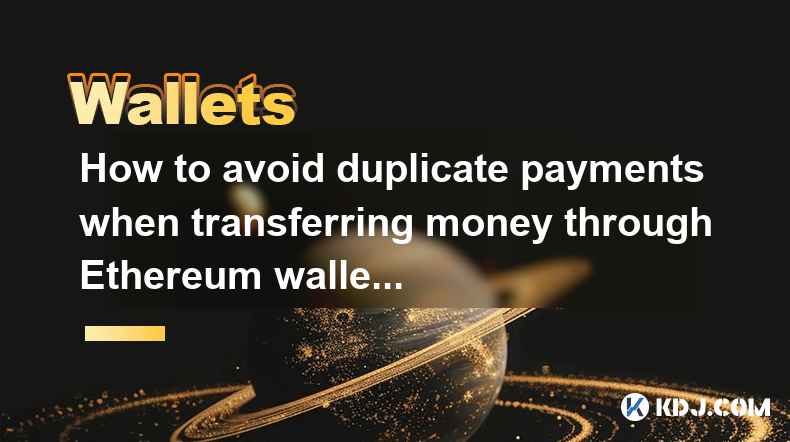
How to Avoid Duplicate Payments When Transferring Money Through Ethereum Wallet?
Transferring cryptocurrency, especially on a network like Ethereum, carries a risk of duplicate transactions. This happens when a transaction is broadcast, but the sender isn't certain if it's been confirmed. They might then resend the transaction, leading to double spending. Understanding how to mitigate this risk is crucial for secure Ethereum transactions.
One of the most effective ways to avoid duplicate payments is to utilize transaction monitoring tools. These tools allow you to track the status of your transactions in real-time. By observing the transaction's progress through the network, you can avoid resending it unnecessarily. Many wallets integrate this functionality, or you can use third-party block explorers.
Another crucial aspect is understanding Ethereum's transaction confirmation mechanism. A single confirmation doesn't guarantee finality. Ethereum employs a probabilistic confirmation system. The more confirmations a transaction receives, the lower the probability of it being reversed. Waiting for a sufficient number of confirmations reduces the risk significantly.
Choosing the right gas price is another vital step. A low gas price can lead to your transaction being stuck in the mempool (the pending transaction pool) for an extended period. This can lead to uncertainty about the transaction's status, tempting you to resend it. A higher gas price generally ensures faster processing. However, you should avoid excessively high gas prices, as this can be inefficient.
Using reputable Ethereum wallets is essential. Well-established wallets usually have built-in safeguards against duplicate transactions. These safeguards might include confirmation notifications and warnings against resending transactions that are already in progress. They may also offer transaction history tracking to help you keep tabs on your transfers.
Reputable exchanges often provide more robust transaction management features compared to individual wallets. These features might include real-time transaction tracking, order cancellation options, and other tools to help prevent accidental duplicate payments. Using an exchange can add a layer of security to your transactions.
Careful double-checking of recipient addresses is paramount. Sending funds to the wrong address is a common mistake, leading to irreversible loss of funds. Verifying the address multiple times before confirming the transaction is a crucial step in preventing costly errors.
Understanding the concept of nonce is also important. The nonce is a number that prevents duplicate transactions. Each transaction must have a unique nonce. Most wallets automatically handle nonces, but it's helpful to understand their function to troubleshoot potential issues.
For enhanced security, consider using a hardware wallet. These devices store your private keys offline, reducing the risk of unauthorized access and accidental transactions. This added layer of security minimizes the chance of duplicate transactions arising from unauthorized activity.
Finally, understanding the limitations of the Ethereum network is crucial. Network congestion can sometimes lead to delayed confirmations, potentially causing users to mistakenly resend transactions. Being aware of network conditions can help you manage expectations and avoid impulsive actions.
Staying informed about the latest security best practices and updates within the Ethereum ecosystem is beneficial. Regularly checking for updates to your wallet software and staying aware of any security advisories can help prevent issues related to duplicate payments.
Frequently Asked Questions:
Q: What happens if I accidentally send a duplicate Ethereum transaction?
A: If you send a duplicate transaction, the first transaction will likely be processed. The second transaction might be processed, leading to a loss of funds. The outcome depends on the gas price and network congestion.
Q: How many confirmations should I wait for before considering a transaction final?
A: While there's no single magic number, waiting for at least six confirmations is generally considered a safe practice. The more confirmations, the lower the risk of reversal.
Q: Can I cancel an Ethereum transaction after I've sent it?
A: You cannot directly cancel an Ethereum transaction once it's been broadcast. However, if it's still pending, a higher gas fee might help it process faster.
Q: What if my transaction is stuck in the mempool?
A: If your transaction is stuck, increasing the gas price might help it get processed. You can also monitor its status using a block explorer. If it remains stuck for an extended period, contact your wallet provider or exchange for assistance.
Q: Are all Ethereum wallets equally secure regarding duplicate transactions?
A: No, the security features vary significantly between different wallets. Reputable wallets with robust transaction management tools generally offer better protection against duplicate transactions. Always choose a reputable wallet from a trusted source.
Disclaimer:info@kdj.com
The information provided is not trading advice. kdj.com does not assume any responsibility for any investments made based on the information provided in this article. Cryptocurrencies are highly volatile and it is highly recommended that you invest with caution after thorough research!
If you believe that the content used on this website infringes your copyright, please contact us immediately (info@kdj.com) and we will delete it promptly.
- MicroStrategy Adds 22,048 Bitcoins to Its Treasury, Bringing Its Total Holdings Above 528,000 BTC
- 2025-04-01 05:50:12
- Despite the US SEC Clearing Ripple Labs, XRP Price Corrected 22%
- 2025-04-01 05:50:12
- ETH Whales Are Dumping Their Holdings Into This Lesser-Known DeFi Project
- 2025-04-01 05:45:11
- Arctic Pablo Coin Leads the Charge with Its Thrilling Adventure-Themed Presale
- 2025-04-01 05:45:11
- Layer Coin: A Big Crash or a Golden Opportunity? 🚀📉
- 2025-04-01 05:40:12
- The first quarter of 2025 tells a clear story about DeFi's evolution. While yields across major lending platforms have compressed significantly, innovation at the market's edges demonstrates DeFi's continued maturation and growth.
- 2025-04-01 05:40:12
Related knowledge
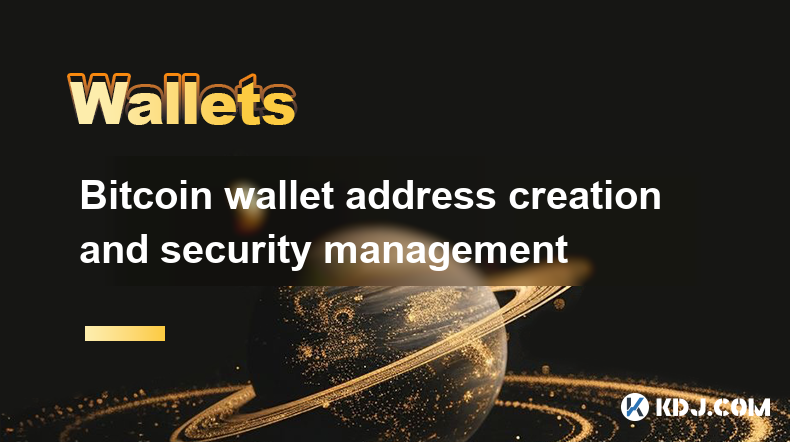
Bitcoin wallet address creation and security management
Mar 31,2025 at 10:56pm
Understanding Bitcoin Wallet AddressesA Bitcoin wallet doesn't store Bitcoin directly. Instead, it stores private keys which are long strings of characters. These keys grant access to your Bitcoin. Your public key, derived from the private key, is used to generate your Bitcoin wallet address, a unique identifier similar to a bank account number. This a...

How to easily generate a Bitcoin payment address
Mar 29,2025 at 10:49am
Generating a Bitcoin payment address might seem daunting, but it's actually quite straightforward. This process is crucial for receiving Bitcoin, as each transaction requires a unique address. Understanding how this works is fundamental to using Bitcoin effectively. This guide will walk you through the simple steps, regardless of your technical experti...
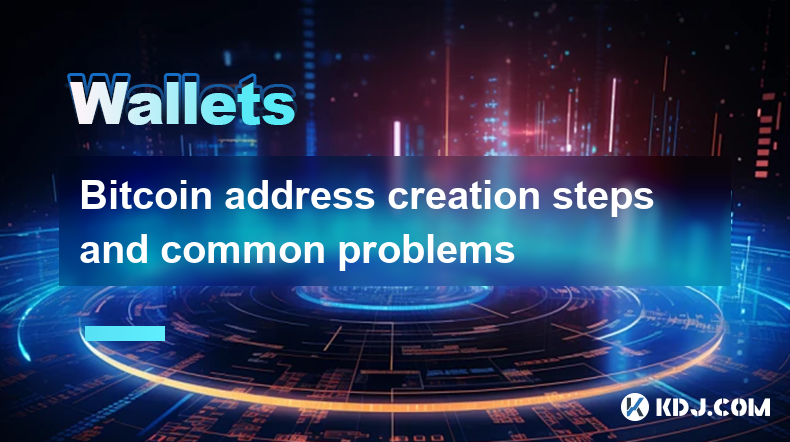
Bitcoin address creation steps and common problems
Mar 30,2025 at 06:07am
Understanding Bitcoin AddressesA Bitcoin address is a unique identifier, similar to a bank account number, used to receive Bitcoin. It's a string of alphanumeric characters generated from a public key, derived from your private key. Understanding the distinction between public and private keys is crucial for Bitcoin security. Your private key should be...
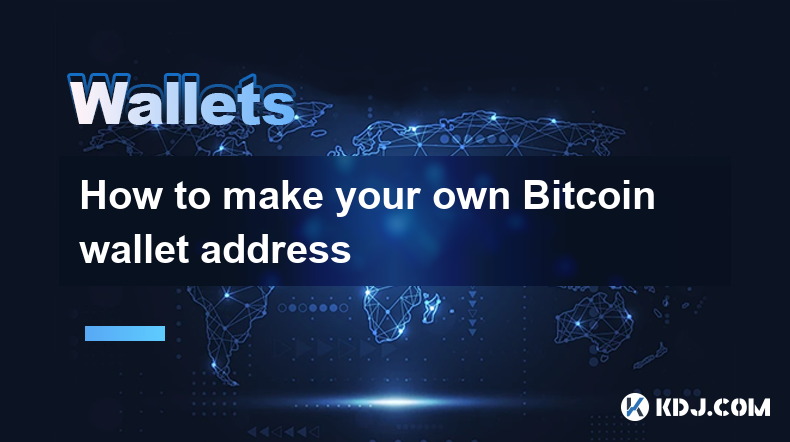
How to make your own Bitcoin wallet address
Mar 29,2025 at 08:42pm
Creating your own Bitcoin wallet address is crucial for securing and managing your Bitcoin holdings. It allows you to independently receive and send Bitcoin without relying on third-party services. This process involves understanding the different types of wallets and choosing the one that best suits your needs and technical expertise. Incorrectly gene...
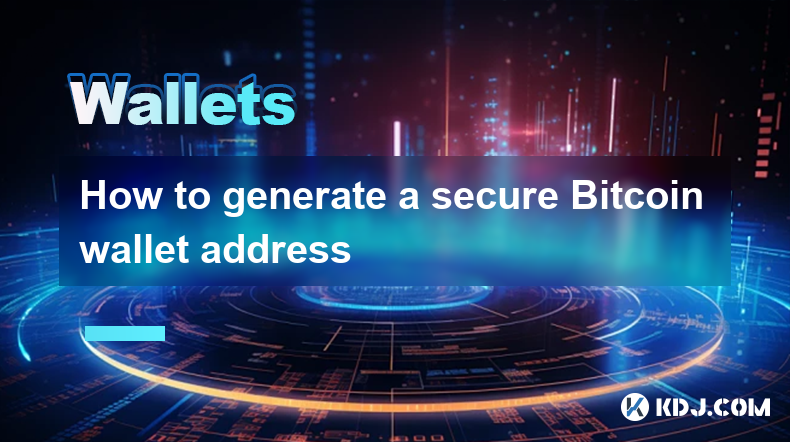
How to generate a secure Bitcoin wallet address
Apr 01,2025 at 03:14am
Understanding Bitcoin Wallet AddressesA Bitcoin wallet doesn't actually store your Bitcoin. Instead, it stores your private keys, which are long strings of characters that grant you access to your Bitcoin. Your public key, derived from your private key, is used to generate your Bitcoin address, a unique identifier similar to a bank account number. This...
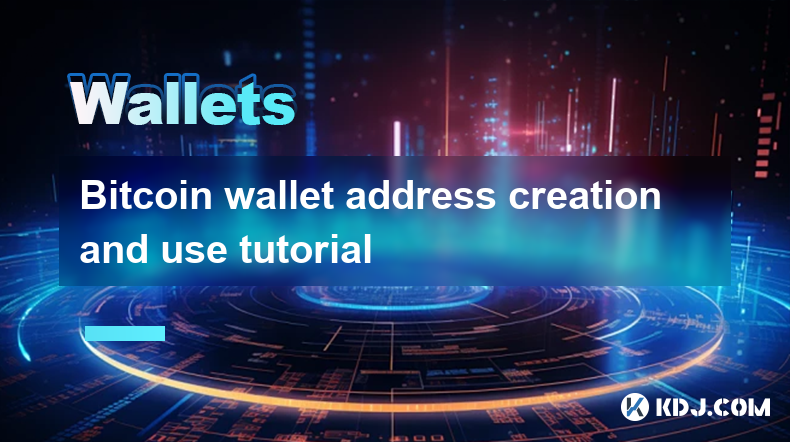
Bitcoin wallet address creation and use tutorial
Mar 29,2025 at 10:14pm
Understanding Bitcoin Wallet AddressesA Bitcoin wallet doesn't store Bitcoin in the way a traditional bank account does. Instead, it stores private keys, which are cryptographic secrets allowing you to access and spend your Bitcoin. Your Bitcoin address, on the other hand, is a public identifier, like an email address, that others can use to send you B...

Bitcoin wallet address creation and security management
Mar 31,2025 at 10:56pm
Understanding Bitcoin Wallet AddressesA Bitcoin wallet doesn't store Bitcoin directly. Instead, it stores private keys which are long strings of characters. These keys grant access to your Bitcoin. Your public key, derived from the private key, is used to generate your Bitcoin wallet address, a unique identifier similar to a bank account number. This a...

How to easily generate a Bitcoin payment address
Mar 29,2025 at 10:49am
Generating a Bitcoin payment address might seem daunting, but it's actually quite straightforward. This process is crucial for receiving Bitcoin, as each transaction requires a unique address. Understanding how this works is fundamental to using Bitcoin effectively. This guide will walk you through the simple steps, regardless of your technical experti...

Bitcoin address creation steps and common problems
Mar 30,2025 at 06:07am
Understanding Bitcoin AddressesA Bitcoin address is a unique identifier, similar to a bank account number, used to receive Bitcoin. It's a string of alphanumeric characters generated from a public key, derived from your private key. Understanding the distinction between public and private keys is crucial for Bitcoin security. Your private key should be...

How to make your own Bitcoin wallet address
Mar 29,2025 at 08:42pm
Creating your own Bitcoin wallet address is crucial for securing and managing your Bitcoin holdings. It allows you to independently receive and send Bitcoin without relying on third-party services. This process involves understanding the different types of wallets and choosing the one that best suits your needs and technical expertise. Incorrectly gene...

How to generate a secure Bitcoin wallet address
Apr 01,2025 at 03:14am
Understanding Bitcoin Wallet AddressesA Bitcoin wallet doesn't actually store your Bitcoin. Instead, it stores your private keys, which are long strings of characters that grant you access to your Bitcoin. Your public key, derived from your private key, is used to generate your Bitcoin address, a unique identifier similar to a bank account number. This...

Bitcoin wallet address creation and use tutorial
Mar 29,2025 at 10:14pm
Understanding Bitcoin Wallet AddressesA Bitcoin wallet doesn't store Bitcoin in the way a traditional bank account does. Instead, it stores private keys, which are cryptographic secrets allowing you to access and spend your Bitcoin. Your Bitcoin address, on the other hand, is a public identifier, like an email address, that others can use to send you B...
See all articles























































































